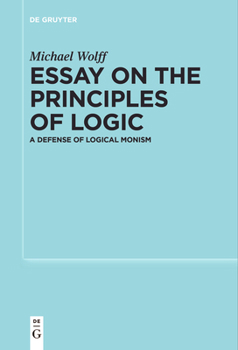Essay on the Principles of Logic: A Defense of Logical Monism
Select Format
Select Condition 
Book Overview
Wolff's book defends the Kantian idea of a "general logic" whose principles underlie special systems of deductive logic. It thus undermines "logical pluralism," which tolerates the co-existence of divergent systems of modern logic without asking for consistent common principles. Part I of Wolff's book identifies the formal language in which the most general principles of logic must be expressed. This language turns out to be a version of syllogistic...
Format:Paperback
Language:English
ISBN:3111624803
ISBN13:9783111624808
Release Date:November 2024
Publisher:de Gruyter
Length:417 Pages
Weight:1.41 lbs.
Dimensions:0.9" x 6.1" x 9.2"
Related Subjects
PhilosophyCustomer Reviews
0 rating





